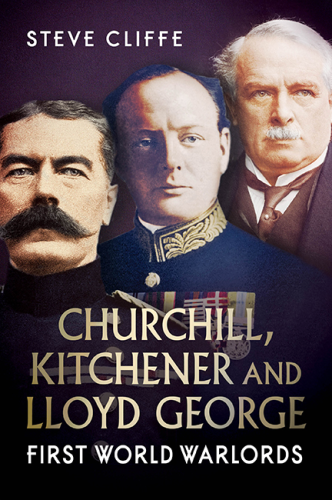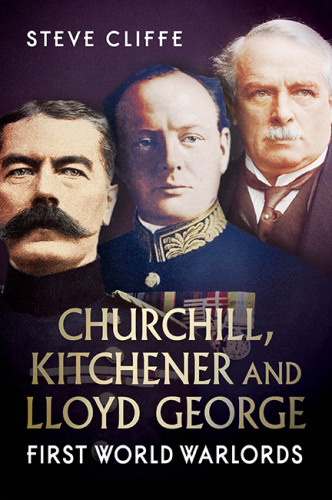
Finest Hour 171
Books, Arts & Curiosities – Trio of Titans

March 20, 2016
Finest Hour 171, Winter 2016
Page 40
Review by Richard Toye
Steve Cliffe, Churchill, Kitchener, and Lloyd George: First World Warlords, Fonthill, 2014, 160 pages, £14.99.
ISBN 978-1781552728
 Of the three “First World Warlords” who are the subject of this enjoyable volume, it is Horatio Kitchener who presents the greatest enigma. Churchill was an extremely prolific writer and speaker. Although he was not always straightforward, he frequently wore his heart on his sleeve; he sometimes attempted to be devious but he was not very good at it, so it was generally fairly clear to other people what he was up to. Lloyd George was—in his prime—a much more effective manipulator and, unenthusiastic about letter writing, left a much less extensive paper trail for historians to follow. Nevertheless, the records of three key diarists (Lord Riddell, Frances Stevenson, and A. J. Sylvester) allow a great deal of insight into his views and actions.
Of the three “First World Warlords” who are the subject of this enjoyable volume, it is Horatio Kitchener who presents the greatest enigma. Churchill was an extremely prolific writer and speaker. Although he was not always straightforward, he frequently wore his heart on his sleeve; he sometimes attempted to be devious but he was not very good at it, so it was generally fairly clear to other people what he was up to. Lloyd George was—in his prime—a much more effective manipulator and, unenthusiastic about letter writing, left a much less extensive paper trail for historians to follow. Nevertheless, the records of three key diarists (Lord Riddell, Frances Stevenson, and A. J. Sylvester) allow a great deal of insight into his views and actions.
Kitchener, by contrast, was closed-off and inscrutable. He had insight and talent—if not quite as much as was popularly attributed to him—but was a difficult colleague, particularly after he joined the cabinet at the outbreak of war in 1914. He was one of the first to predict that the conflict would be long and drawn-out and would require an enormous number of men; yet, viewing the War Office as his own personal fiefdom, he was extremely reluctant to share information with other ministers. The description Lloyd George offered in his War Memoirs was apposite: “He was like one of those revolving lighthouses which radiate momentary gleams of revealing light far out into the surrounding gloom and then suddenly relapse into complete darkness.”
It is hard to discover much about the author of this book, although he mentions that he was born during Churchill’s final term in Downing Street and that he has worked as a journalist. He narrates the three men’s lives up to the end of the Great War in a lively fashion, and interweaves the different plot-lines with skill. He does not deploy new sources, but he clearly did not intend to write a scholarly book. One irritation, though, is that he does not provide any footnotes. This causes annoyance when one comes across an unfamiliar or forgotten quotation and wishes to check where it came from. On the upside, however, Cliffe writes well and his judgements are generally sound. (A comment that Kitchener “understood the Oriental mind” can be written off as an unfortunate glitch.) Anyone who does not know the period will find this an interesting introduction.

2024 International Churchill Conference
There remains, of course, much more to be said. The Churchill-Lloyd George-Kitchener story is revealing of what I would argue was a long-standing crisis in UK civil-military relations. This was most obviously in evidence at the time of the so-called Curragh “mutiny,” but which also manifested itself repeatedly throughout the First World War and beyond. In August 1914, Asquith as Prime Minister not only faced the difficulty of bringing the Liberal Party united into war; he also had to deal with an army that profoundly distrusted him and his government, not least as a consequence of its efforts to bring about Irish Home Rule. In this situation, the appointment of Kitchener as War Secretary was a political masterstroke, because to question the hero of Omdurman was to raise questions about one’s own patriotism. But when he proved doubtfully effective, Asquith was stuck with him. Kitchener knew it, telling Douglas Haig: “Rightly or wrongly, probably wrongly, the people believe in me. It is not me the politicians are afraid of, but what the people would say to them if I were to go.” In the end, the politicians sent him on a mission to Russia. His ship struck a mine and he drowned. One imagines that, in various parts of Whitehall, there were a number of skilfully concealed sighs of relief.
Richard Toye is Professor of History at the University of Exeter. He has written three books about Churchill, including Lloyd George and Churchill: Rivals for Greatness (Macmillan, 2007).
Subscribe
WANT MORE?
Get the Churchill Bulletin delivered to your inbox once a month.


